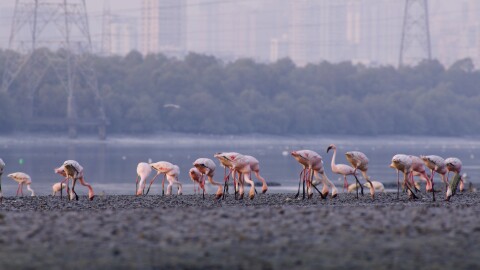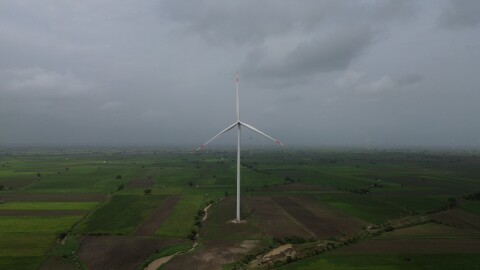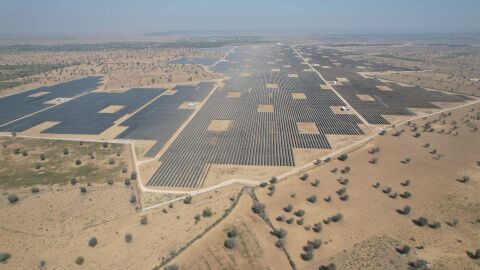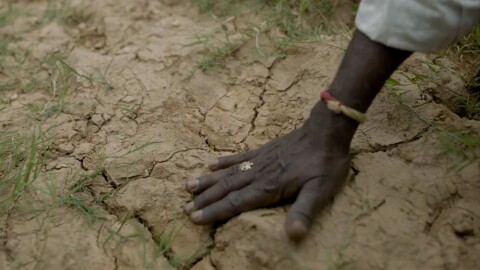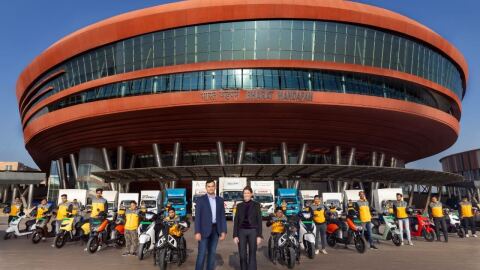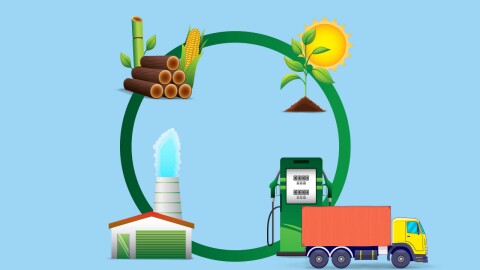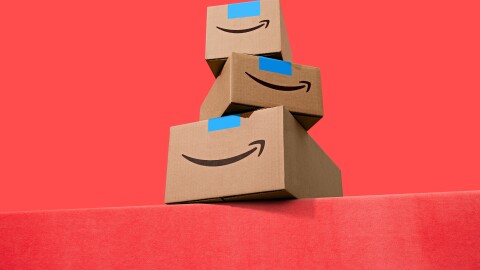As part of our commitment to The Climate Pledge, we are dedicated to achieving net-zero carbon emissions by 2040. We also know that sustainability goes beyond protecting the environment; it’s about protecting the human rights of the people and communities that support our value chain, too. In this weekly series, you’ll meet some of the women advancing Amazon’s sustainability commitments in a variety of ways—all of which are helping us become a more sustainable business.
As part of our commitment to The Climate Pledge, we are dedicated to achieving net-zero carbon emissions by 2040. We also know that sustainability goes beyond protecting the environment; it’s about protecting the human rights of the people and communities that support our value chain, too. In this weekly series, you’ll meet some of the women advancing Amazon’s sustainability commitments in a variety of ways—all of which are helping us become a more sustainable business.
-
Gangamma
Building a more resilient and inclusive supply chain

Gangamma, sustainability program manager for Amazon Social Responsibility.
Gangamma says there was a time when she wasn’t aware that she could pursue a career in social work. She now develops programs and relationships on behalf of Amazon’s Social Responsibility team to ensure fundamental human rights are embedded across Amazon’s global supply chain.
Growing up in India, Gangamma studied science and microbiology in college after her parents encouraged her to become a doctor. It wasn’t long before she realized science wasn’t her passion.
“I always knew it wasn’t what I wanted to do,” Gangamma said. “I did end up graduating with a science degree, and during that time, I was also a trained dancer. I met a lot of other dancers who were studying social work, and that’s when I realized I could actually turn this passion into a career.”
When Gangamma decided to pursue a master’s degree in social work, she remembers being hesitant to tell her parents. Thankfully, their reaction quickly reassured her.
“If you want to do it, just do it,” Gangamma recalls her mother saying. “She was the one who really stood by me and always told me that I should never stop studying.”
Gangamma also recognized that having access to ongoing education—as well as other resources like health care and professional development training—wasn’t always a reality for women in her country. She wanted to change this and found a way to do so by working for a nonprofit called Swasti. There, she learned about the challenges women face in the workplace and what global brands were doing to encourage gender equity in their supply chains. She began working with companies to develop women’s empowerment programming and to build her network.
I think social responsibility is the key between people and community.
GangammaSustainability program manager for Amazon Social ResponsibilityIn 2020, Gangamma brought her skillset to the Amazon Social Responsibility team.
“They valued my subject matter expertise and unique perspective,” Gangamma said. “They trusted that I had the knowledge, and I’ve always enjoyed having the independence to work someplace where they believe in you. That was my expectation coming into Amazon, and that is exactly what happened.”
Since joining the Social Responsibility team, Gangamma has been driving change for gender equity across the factories that support Amazon’s Private Brands supply chain in the South Asia region. Through a partnership between Amazon, the BSR HERproject, and Swasti4WE, she’s led efforts to reach more than 20,000 women with training focused on health and financial skills. Both the BSR HERproject and Swasti4WE bring together global brands, their suppliers, and local partners to create and implement workplace-based interventions on health, financial inclusion, and gender equality.
Gender equity is an important part of Amazon’s work to strengthen the resiliency and sustainability of the company’s broader global value chain. It’s also one of Amazon’s five Key Commitments for responsible sourcing; the other four are safe workplaces, freely chosen employment, fair wages, and environmental protection.When asked how gender equity and inclusion contribute to building a more sustainable business, Gangamma shared her personal definition:
“It’s a balance between people, planet, and community,” she said. “To me, you can’t truly be a sustainable brand unless you’re protecting all three points. There are different ways of achieving this, and I think social responsibility is the key between people and community. As a worldwide brand, Amazon is a leader in the sustainability industry, and when we take steps to think about sustainability beyond the environment, we hope others will follow.”
Note: Ganagamma prefers to use her first name only for the purposes of sharing her story.
-
Alyssa Boggs
Breaking down barriers to advance gender equity across Amazon’s supply chain

Alyssa Boggs, external engagement and partnerships strategy lead for Worldwide Sustainability.
Boggs was on a flight headed to a business meeting when she received the news that became the proudest moment of her professional career (so far). Amazon CEO Andy Jassy had signed the United Nations Women’s Empowerment Principles (WEPs), and Amazon would also be donating $1 million to the Resilience Fund for Women in Global Value Chains.
At the time, Boggs was a senior strategic partnership manager on Amazon’s Social Responsibility team, working directly with organizations focused on inclusivity and women’s empowerment in the workplace. As part of her work, she advocated for Amazon to demonstrate its continued commitment to gender equity by signing the WEPs.
Supported by more than 5,000 corporate signatories, the WEPs were established by the United Nations Global Compact and UN Women to offer businesses guidance on ways to promote gender equity and to empower women in the workplace and global community.
I’ve really been able to see that when you lift up women, you lift up communities.
Alyssa BoggsExternal engagement and partnerships strategy lead for Worldwide Sustainability at AmazonAdvancing gender equity is an important part of Amazon’s work to strengthen the resiliency and sustainability of its broader global value chain. It’s one of the company’s five Key Commitments for responsible sourcing; the other four are safe workplaces, freely chosen employment, fair wages, and environmental protection. It’s also important to Boggs, who has a master’s degree in peace studies and conflict resolution from the London School of Economics and Political Science.
“I was ecstatic when I found out—I couldn’t contain my excitement in the moment on that plane,” Boggs said. “I knew Amazon was already doing a lot of the work to advance women’s empowerment. It was important to me that we made our commitment clear to our customers and stakeholders by supporting the WEPs. I also knew that joining the WEPs would allow us to learn from other signatories. We can’t solve everything on our own, and we’re more impactful when we collaborate with others.”
Amazon signs the United Nations Women’s Empowerment Principles and makes $1 million donation to the Resilience Fund for Women in Global Value Chains.Long before the WEPs were signed, Boggs was already applying the purpose behind them to her work. She started her career with Amazon in 2015 and previously spent a number of years working for nonprofits including WorldVision and the Gates Foundation. Those experiences inspired her to look for opportunities at Amazon where she could drive change for underserved communities.
In 2016, Boggs transitioned to Amazon’s Social Responsibility team within the Worldwide Sustainability organization where she focused on building external partnerships that prioritized conducting business responsibly. Her work included building a collaboration with Nest, a nonprofit supporting the responsible growth and creative engagement of the global handworker economy. Boggs saw an opportunity to introduce representatives from Nest to Amazon Handmade, which strives to empower local artisans and connect them to customers around the world. As a result, Amazon Handmade and Nest announced a partnership in September 2021 to provide more than 250,000 artisans worldwide—the large majority being women—with the support and technology to reach Amazon’s millions of customers and grow their small businesses in the process.
“Through my professional work and my educational background, I’ve really been able to see that when you lift up women, you lift up communities,” said Boggs. “For me, it really all comes down to humans supporting other humans.”
-
Melanie LeGrande
Supporting the fight against human trafficking through Amazon Web Services

Melanie LeGrande, rights and equity lead for Amazon Web Services (AWS) Global Social Impact.
Each year, an estimated 25 million people are trafficked worldwide. It’s a global public health issue that has become even more prevalent during the COVID-19 pandemic, as criminals look to capitalize on the amount of time both adults and children are spending online.
To address this growing problem, institutions around the world are developing tools to defend people of all ages from online predators. Several nonprofits confronting human trafficking rely on AWS to power their technology, and when these customers need additional support to amplify their work, they turn to the AWS Global Social Impact team.
If technology is an enabler of this issue, then technology should be utilized to fight it.
Melanie LeGrandeRights and equity lead for AWS Global Social Impact“It’s important for me to make a difference in the lives of individuals and communities that need our help,” said LeGrande. “Advancing human rights and safeguarding protections for vulnerable populations is integral to Amazon’s commitment to corporate social responsibility, and confronting human trafficking is a big focus of my work. It’s rewarding for me to support those on the forefront of this issue and help them accelerate their cloud-first technology strategies.”
Before joining Amazon in 2021, LeGrande spent 17 years focused on social impact through various institutions including Major League Baseball, the National Football League’s Baltimore Ravens, and the Silicon Valley Community Foundation. The recurring theme of her work no matter the employer, she said, has always been: “How can I best leverage my company’s assets to positively impact people in our society?”
She’s carried that mentality into her role with AWS, supporting nonprofits like Polaris and The Lantern Project. For both organizations, AWS provides services that enable their systems to be more efficient, and LeGrande identifies opportunities to bring broader awareness to their work through speaking engagements, employee engagement, and marketing efforts.

“My job is to listen to our customers, understand their goals and operational challenges, and work with them to deliver on their ambitious missions to change the world,” LeGrande said.
Polaris runs the U.S. National Human Trafficking Hotline to help victims and survivors of the illegal $150 billion industry. Through the hotline, Polaris has handled more than 330,000 signals—including calls, texts, online chats, webforms, and emails—and identified more than 73,000 situations of human trafficking since 2007. AWS works with Polaris to infuse cutting-edge technology into its infrastructure and drive the organization's development of the largest known U.S. data set on trafficking. Polaris then uses that data to improve the way trafficking is identified by law enforcement and others, how service providers assist victims and survivors, and how communities, businesses, and governments can prevent it by transforming the underlying inequities and oppressions that make it possible.
Similarly, The Lantern Project works to end trafficking exploitation across communities by changing culture through prevention, intervention, and transformation. The organization is also part of the Tech Against Trafficking Accelerator program, an initiative that connects Tech Against Trafficking’s member companies (including Amazon) to expedite technological advancements that will help eradicate human trafficking.
To LeGrande, Amazon’s ability to collaborate with others in the fight against human trafficking is not only the right thing to do, it’s a responsibility.
“Studies have shown that technology has enabled trafficking to grow as a criminal enterprise,” she said. “AWS has the resources, expertise, and infrastructure to help bring an end to human trafficking worldwide. We should be working with anyone and everyone we can to provide the best available solutions. If technology is an enabler of this issue, then technology should be utilized to fight it.”
If you or someone you know may be a victim of human trafficking or has a tip about a potential case of human trafficking, contact the U.S. National Human Trafficking Hotline by calling 1-888-373-7888 (TTY:711) or texting “BeFree” (233733). Help is also available via live chat.
-
March 25
Check back each week during the month of March to meet more of the women working to improve sustainability at Amazon.
-
March 29





